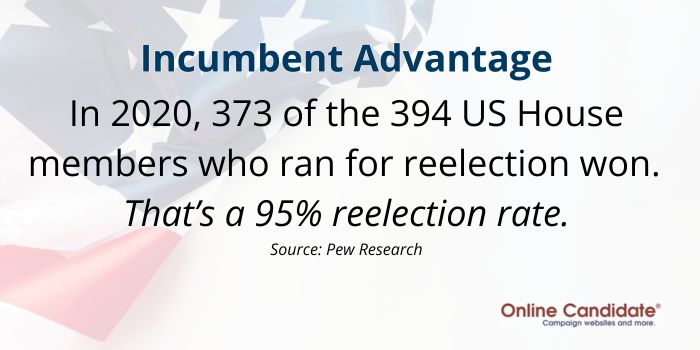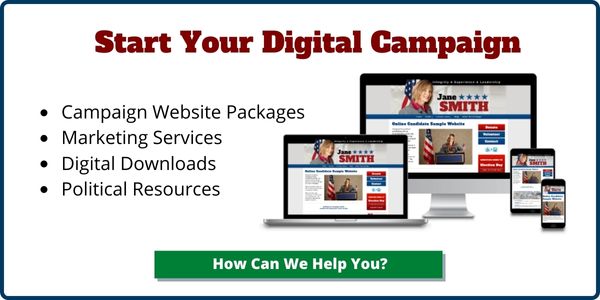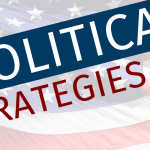Are you about to challenge a popular candidate for office? If so, there’s a good chance that you don’t have much government experience, influential connections, or money. This can make facing off against an experienced, well-known, and well-financed incumbent even tougher. But with the right political campaign strategies, including grassroots mobilization strategies and tactics, you can effectively leverage your underdog status and pull off a win.
Successful challengers focus on two things: exposing the incumbent’s weaknesses and making their own strengths stand out.
This approach allows you to create a stark contrast between yourself and your opposition. You can even turn your own weaknesses to an advantage. (For example, you’re NOT an insider or heavily connected to powerful special interests.)
Key Takeaways
- Incumbents have advantages like name recognition, but their long tenure can make them appear out of touch.
- New political candidates can capitalize on fresh appeal and introduce new ideas.
- Researching an incumbent’s history is essential for an effective campaign strategy.
- Securing funds, organizing volunteers, and using digital and grassroots campaigning techniques are crucial for voter reach.
- Combining traditional canvassing with digital outreach boosts voter turnout.
The advantages of political incumbency
An incumbent is any politician or government official who holds an elected position and is running for reelection. In an election, incumbents often have several built-in advantages that make them hard to beat.
- Incumbents have strong voter name recognition. Depending on the position, such as mayor or supervisor, they may have a lot of built-in media coverage. Even having been on the ballot previously provides a degree of name advantage to voters.
- They already know the responsibilities and expectations of the job. They can point to this experience and highlight their achievements to voters.
- They have experience in the campaigning process and a record of reelection success.
Statistic example: In 2020, 373 of the 394 U.S. House members who ran for reelection won – a 95% reelection rate.
Usually, incumbents also have a financial advantage. They already have a base of donors they can tap for the next campaign. This underscores the importance of solid fundraising strategies if you plan to defeat a sitting incumbent.

What are the disadvantages of being an incumbent candidate?
Incumbents have a few weaknesses, as well. The first can be the most difficult to overcome if an opponent skillfully uses it to their advantage:
- An incumbent politician has a record in office. What they’ve voted on, what they’ve said or done, and their previous campaigns are all out there on the public record. Social media makes it easy to look up history and keep on top of what an incumbent is doing in office.
- Incumbents can become complacent. They may stop producing new ideas or fail to address voter frustrations because they’ve been in power too long.
- Because they are comfortable, an incumbent (or any politician who has been in office for a long time), may lose touch with the people they represent. In some cases, they may even become arrogant or hostile to criticism. Hubris can make them forget how hard it was to be an outsider making their way up the political ladder.
In larger state and federal elections, where voters are frequently irritated by stalled policies or a lack of innovative ideas, it can be especially helpful to recognize and take advantage of these problems.

You can beat an entrenched incumbent with a solid strategy and hard work.
Capitalize on Being a Political Newcomer
There are a few advantages to being an unknown political opponent. For example, when you first announce your campaign, the local media will probably give you plenty of attention. Be open to interviews and use every opportunity to get your name out to the public. Ride the wave while you can. As the campaign season goes on, your coverage will likely normalize.
One of the biggest advantages of being a political newcomer is that nothing has defines you – yet. You have less baggage than your opponent who already holds office. With no previous legislative record or voting history, you can freely stake your own policies and positions on the issues.
Additionally, newcomers can often appeal to younger and more diverse voter bases. By engaging with new perspectives and effective digital outreach, you can appeal to those demographics that incumbents often ignore.
You can introduce new ideas and propose real change to the way things are done. There may be issues that the current government is not addressing. Take an old idea that’s been sidelined and propose it again. This can allow you to define the issues and put the incumbent on the defensive, utilizing opposition research in political campaigns to your advantage.
Study the voting demographics of the area that you are running in. Learn about your voters. Find out what they care about and how they feel about their currently elected officials.
Related: How to Run for Local Office: Tips for a Winning Campaign
Opposition Research: Study Your Incumbent Opponent
Knowing your opponent is non-negotiable.
Research includes:
- Their policy positions, strengths, and weaknesses.
- Their past campaign tactics: do they rely on late negative ads? What demographics do they target?
- Their behavior under pressure: are they prone to gaffes, outbursts, or dismissive responses?
This intel helps you craft political advertising and anticipate attacks.
What tactics they’ve used in the past to win? Do they run negative ads just before Election Day? Where do they advertise? What voter demographic do they specifically target?
This information can provide helpful insights into how to best frame your issues. It will also give you an idea of what you can expect to happen during the race, making effective political advertising a crucial component of your strategy. This is particularly important in areas where elections with incumbents have historically low voter turnout or where local issues, such as infrastructure or education, remain unresolved.
Turnout Strategies: How to Mobilize Voters
Turnout, especially in most local races, is critical to victory.
-
Local example: One campaign we worked on won by tapping into voter anger over overdevelopment. By focusing messaging on that issue, turnout surged, and the challenger beat the well-established “good old boy” network.
-
State/federal races: Use targeted digital advertising and voter data to find persuadable groups. For example, suburban parents concerned with child care or education are often key swing voters.
Include early voting, absentee ballots, and voter registration drives in your GOTV plan.
State and federal elections requires more sophisticated efforts to drive voter turnout. These efforts might include deploying targeted digital advertising and leveraging voter data in order to focus resources on swing districts or underrepresented groups. For example, targeting suburban women voters with specific messaging that addresses educational or child care needs can make a critical difference in high-stakes races.
What You Need to Beat a Popular Opponent
The primary skill needed to win is your ability to raise money. You can’t wait on this. You’ll need to have an idea of what amount of money you’ll need to raise. If you have a primary, you’ll need to raise enough to get through the first hurdle. Then you will need raise enough funds for the general election. You should either have a large donor base to start or be able to build one quickly.
The second requirement to effectively organize volunteers and staff members. You will need their help with things like arranging public meetings, phone banking, and canvassing neighborhoods in your area or district. As your organization grows, you can recruit volunteer organizers to better coordinate their efforts.
Even local races use digital media and promote themselves through Facebook, Twitter, and Instagram. Platforms such as Facebook Live and YouTube have also become popular. Today, it’s easy for anyone to quickly record, edit, and upload video content. This highlights the importance of building a political campaign website to centralize your digital presence.
For larger races, integrating advanced tools like CRM systems and voter behavior analytics can help streamline your volunteer coordination and outreach. Each team member must learn to use the tools effectively in order to optimize communication and maximize voter engagement.
Play the Game on Your Terms
Every candidate and campaign has their own unique playing field. For example, strategies for state or congressional races may not work well in a local election with a low voter turnout.
As a political newcomer, you might have a unique advantage over other candidates: You are not associated with any previous failures or scandals. Establish yourself as a credible candidate, stay positive, and run an effective campaign. If you do that, then you’ll have a good chance of winning your election!
Free Digital Campaigning Tips: Subscribe for free guides and updates from Online Candidate.
FAQs
Why are incumbents so hard to beat?
Because they have name recognition, established donor networks, and a record of election success.
How can I make a strong case against an incumbent’s record?
You can highlight the incumbent candidate’s failures and shortcomings while in office, including missed opportunities, broken promises, and negative impacts on the community. Research and gather facts to back up your claims, and tell voters about them in a clear and convincing way.
What strategies can I use to differentiate myself from the incumbent candidate?
Highlight your unique qualifications, experiences, and perspectives, as well as your concrete plans and vision for the future. Focus on the ways you are better qualified than the current candidate to serve the community and meet its needs. Contrast your differences, and make the race a clear choice to voters.
How can technologies like AI and data analytics be leveraged to defeat a political incumbent?
With AI and data analytics, you can spot where they’re slipping. You can use these tools sift through voter data and social media chatter. They’ll show you where the incumbent’s message isn’t hitting home. Use this intel to craft messages that speak directly to those gaps. This helps you be smart with where you focus your efforts. Target those swing areas or demographics that are starting to question the incumbent’s effectiveness. Craft targeted messaging that addresses these gaps and focus your efforts on swing districts or emerging voter concerns.
How is personal brand important when facing off against an incumbent?
Standing out is key when you’re up against someone with a well-known, established reputation. Your personal brand is what makes you the fresh alternative. Start by being you, authentically. Highlight what sets you apart. Maybe it’s your innovative ideas or your commitment to community issues. Whatever it is, make sure it shines through. This is how you’ll connect with voters looking for change.
How can I handle crises effectively while challenging an incumbent?
Crises can and will pop up, especially when incumbents try to put you in the hot seat. Crisis management requires that your team stays on top of social media and news. This way, you can respond swiftly when something comes up. Always stick to the facts and keep your message positive. Showing you’re accountable and transparent can actually boost your image. It shows you’re a breath of fresh air compared to the usual political games. Crisis response plans should be put together in advance. They should include a protocol for addressing misinformation or attacks, and how to maintain your credibility and transparency in the event of a crisis.
How can I build a coalition of support for my campaign?
Build a coalition of support through individuals and community groups. Reach out to grassroots organizations, labor unions, business groups, political figures, and local community leaders. Build relationships. Listen to their concerns and ideas, and get them involved in your campaign.
What are some key factors to consider when running against an incumbent candidate?
Some key factors include having a clear message and platform; building a broad and diverse coalition of support; effectively communicating with voters and addressing their concerns; and having a strong and well-organized ground game. It’s also important to write a detailed plan, put together a strong campaign team with fundraising skills, and organize a committed team of staff and volunteers.
How can I engage and mobilize voters to turn out on election day?
There are a number of ways to engage and motivate voters on election day. Most campaigns still rely on traditional door-to-door canvassing, phone banking and social media outreach. Targeted advertising to households with a strong history of voting is also effective. Start early to build a strong GOTV effort with a well-organized and motivated volunteer base. Use voter behavior analytics to identify households with high voting potential. Focus your GOTV efforts on these areas. Start early to build momentum and create a motivated volunteer base for election day activities.
« Don’t Let Weak Copy Undercut Your Political CampaignWinning Local Elections Is About Getting Voters To Take Action »








